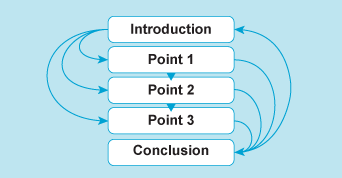1.1 The house analogy
One way to look at an essay is to imagine that the writer is behaving in the same way as someone who is selling a house and showing the potential buyers around the different rooms. This analogy is used in the next activity.
Activity 1
Chris Lee, an Open University tutor, uses the house analogy when she helps students to understand essay structure and the importance of linking ideas. Read the advice she offers her students and then answer the questions that follow:
Try to pretend that you are somebody selling a house and showing the clients around it. You would start with an introduction to the house, possibly just before entering or while standing on the doorstep. In this introduction, you would mention the number of rooms and where these are located. This is just like the introduction to an essay.
Then you would move into the living room and say, ‘This is the living room’, which is just like a topic sentence, and you would describe what is in the living room – that is the rest of the paragraph. You would then move into the next room, which is the next paragraph, introduce that, give the detail and then move on again.
When using the house analogy, moving into a new room is like introducing a new topic. You need to give the introduction to the room first, for example say, ‘This is the dining room where we eat’, rather than saying the detail like, ‘Look at the knives and forks’. In the same way, when writing an essay you need to start with a clear topic sentence and then fill in the detail later, rather than the other way round.
The room analogy can help you deal with the logic of the argument, and linking paragraphs, which is one of the key difficulties, I think, for many students. You don’t just leap from one room to the other but you make a sort of transition. For example, if you were going up the stairs to the bedroom you would have to finish showing the downstairs and use the stairs to link to the bedroom.
In a similar way, you should not leap from one bit of the essay to the next. You have to link the paragraphs together logically for the reader so that there is a flow in the argument that makes the logic stand out.
- What is the mistake many students make?
Answer
Students have problems showing the logic of the main point they are making and linking their ideas. They leap from one part of the essay to another.
- Why is it important to link paragraphs?
Answer
The student’s logic must stand out and the essay should flow.
To ensure all the components of an essay are clearly linked and the text flows, it is important to use the first paragraph to tell the reader what the essay will be about. This can be done by introducing its topic, and then linking it to the assignment question by stating the main claim and outlining the rest of the text.
The body paragraphs also link to the assignment question. They follow the outline given by the introduction, develop the theme of the essay and support the writer’s main point.
The conclusion should link to the title and to the introduction by restating the writer’s main claim and by referring to the supporting points made in the paragraphs.
These links are illustrated in Figure 1.

